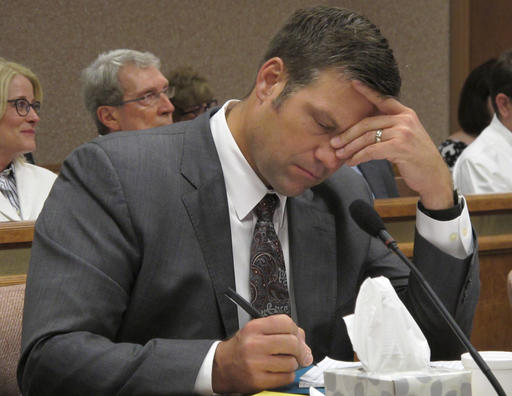A New York Times survey that found very few instances of voter fraud in the 2016 election received the input of every state but one: Kansas, where the top elections official is Secretary of State Kris Kobach.
Kobach has been an ardent supporter of voter restrictions, which he champions on the claim that they’re needed to prevent voter fraud. He has also been an adviser to President-elect Donald Trump, who has argued, without any evidence, that “millions” of people voted illegally in the November’s election.
It is unclear from the New York Times story whether the Times reached out to Kobach directly, his Secretary of State’s office or some other state entity.
“But inquiries to all 50 states (every one but Kansas responded) found no states that reported indications of widespread fraud,” the Times said in Sunday’s report.
Among the 49 other states that engaged in the Times’ inquiries, elections officials found little evidence that illegal voting was a major problem. Some reported a handful of cases they had investigated. Georgia had opened 25 inquiries out of more than 4.1 million ballots cast, while Tennessee officials said that they had tallied 40 allegations deemed credible among 4.3 million primary and general election votes.
But in many places, even those sort of investigations don’t pan out. Kentucky officials said that the 18 allegations of voter fraud reported on its hotline were found to be not credible upon investigations. Twenty-six of the states participating said they had found no credible cases of voter fraud, and in eight states, election officials said they had only had heard of only one.
“The findings unambiguously debunk repeated statements by President-elect Donald J. Trump that millions of illegal voters backed his Democratic opponent, Hillary Clinton,” the Times said. “They also refute warnings by Republican governors in Maine and North Carolina that election results could not be trusted.”







There you go again with the facts. Repeat after me, slowly: “Facts don’t matter.”
ETA: “Whatsa matter, Kris, baby? Cat got your tongue?”
It is much easier to claim voter fraud than to prove it.
Of course no state reported instances of widespread fraud. That’s because they’re in on it.
So at the rate at which the leads actually pan out, voter fraud adds likely at most a handful of votes while voter suppression, ID laws, poll restrictions etc, subtract like hundreds of thousands per every fraudulent vote? NYTimes should include an estimate of numbers and percentages of people who have been disenfranchised by various ID laws to compare to this approximately 0.0000004% of possibly deliberately fraudulent votes.
BUT…BUT…TEH EMAILZ…
Good job, ‘Morans’.